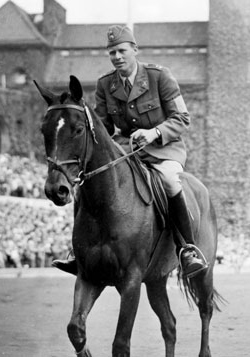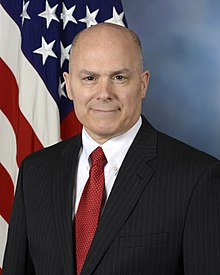폴 왈리히
Paul WallichPaul Wallich (1882–1938)는 독일 은행가이자 도이치 뱅크의 [1]설립자 중 한 명인 은행가 헤르만 발리히의 아들이었다.스스로를 기독교인이라고 여겼던 동화 유대인인 그는 Dreyfus & Co.의 파트너가 되었다.왈리히는 또한 3만 [2]권의 책을 소장한 학자이자 책 수집가였다.
나치가 권력을 잡았을 때, 월리치와 그의 은행은 유대인의 유산 때문에 박해를 받았다.이 은행은 아리안화 [3]되어 뮌헨에 본사를 둔 비유대계 은행인 Merck Finck & Co.로 넘어갔다.그는 연간 5만 마르크에 10년 컨설팅 계약을 맺었다.
월리히는 크리스탈나흐트 포그롬의 [3]여파로 쾰른에서 라인강에서 스스로 목숨을 끊었다.
메모들
- ^ Reinhard Frost, webdecker-www webdecker de, webdecker-. Hermann Wallich A Banker in Paris, Shanghai and Berlin.
- ^ Engelbourg, Saul. "HENRY C. WALLICH: A THIRD GENERATION BANKER".
In the early twentieth century; Paul published the standard text on the evolution (concentration) of German banking before 1900, followed several decades later by a study of Berlin entrepreneurs during the early industrialization. An avid reader and book collector, Paul accumulated a personal library of 30,000 volumes.
- ^ a b r2WPadmin. "Expulsion – Plunder – Flight: Businessmen and Emigration from Nazi Germany". Immigrant Entrepreneurship. Retrieved 2022-02-08.
One tragic example was the banker Paul Wallich (1882–1938), who had been running the Berlin branch of the Frankfurt private bank J. Dreyfus & Co. since 1919.[72] In 1938, in the wake of the “Aryanization” of the Frankfurt parent house and the takeover of the Berlin branch by a Munich bank, Wallich had been given, as a condition for the transaction, a ten-year consultant contract with an annual salary of 50,000 RM ($20,000 in 1938 U.S. dollars; $311,000 in 2010 U.S. dollars). As a young man, Wallich had spent multiple stints abroad from 1907 to 1910 in preparation for his future work as a banker—in London, Paris, New York, and South America—and, given his international experience, emigration abroad seemed to offer a way out.[73] Nevertheless, Wallich’s ties to Germany were too strong for him to make the decision to leave the country permanently, especially since he had to expect a worse professional position and a lower standard of living abroad. Added to this was that he was presumably threatened with the termination of his contract in the fall of 1938.[74] By his own decision he returned to Berlin from a stay in New York, where the November pogrom and fear of being arrested made him flee to Cologne. Matters in Germany were “no longer bearable” to him, he wrote in a farewell letter to his son, and “I no longer have the energy to go abroad.” The last message to his wife also conveyed his despair: “I am so tired… All the thousand cares and bothers that would come with my starting over—I don’t even have the nerves to cross the border now, with or without passport.”[75] On November 11, 1938, Wallich drowned himself in the Rhine near Cologne.
{{cite web}}:확인.archive-url=값(도움말)


